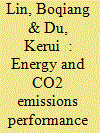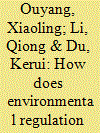|
|
|
Sort Order |
|
|
|
Items / Page
|
|
|
|
|
|
|
| Srl | Item |
| 1 |
ID:
137744


|
|
|
|
|
| Summary/Abstract |
This paper employs a newly developed non-radial directional distance function to evaluate China's regional energy and CO2 emission performance for the period 1997–2009. Moreover, we analyze the impact of China's market-oriented reform on China's regional energy and carbon efficiency. The main findings are as follows. First, most of China's regions did not perform efficiently in energy use and CO2 emissions. Provinces in the east area generally performed better than those in the central and west areas. By contrast, provinces in the west area generally evidenced the lowest efficiency. Second, Market-oriented reforms, especially the promotion of factor market, were found to have positive effect on the efficiency of energy use and CO2 emissions. Third, the share of coal in the total energy consumption and the expansion of the industrial sector were found to be negatively correlated with China's regional energy and CO2 emissions performance. Based on the empirical findings, we provide policy suggestions for enhancing energy and carbon efficiency in China.
|
|
|
|
|
|
|
|
|
|
|
|
|
|
|
|
| 2 |
ID:
176694


|
|
|
|
|
| Summary/Abstract |
Promoting technological innovations by environmental regulation is one of the essential means to achieve green transformation. This study investigates the effect of environmental regulation on technological innovations based on the provincial panel data of industrial sectors in China during the years 2005–2015. The two-way fixed-effect panel data model is used to investigate the marginal and heterogeneous impacts empirically. Results indicate a U-shaped relationship between environmental regulation and technological innovations. In the short-term, environmental regulation has an “offsetting effect” on the research and innovation capacity of China's industrial sector. However, with the deepening of environmental regulation, it forces the industry to reduce the cost of pollution control by improving technological innovation capacity, thus creating a “compensation effect”. Results also show that environmental regulation policies changed the location and industry selection of foreign capital, which weakened the positive effect of FDI on technological innovations, indicating the “pollution shelter” effect. From the perspective of different types of enterprises, due to the higher cost of energy conservation and emission reduction, environmental regulation is detrimental to the technological innovations of state-owned enterprises. In particular, we find that industries with a higher degree of market competition and higher human capital investment tend to have stronger technological innovation capabilities.
|
|
|
|
|
|
|
|
|
|
|
|
|
|
|
|
| 3 |
ID:
166715


|
|
|
|
|
| Summary/Abstract |
Alleviating global climate change requires the development and adoption of green technology innovations. Particularly, the sustained economic growth requires green technology innovations in promoting carbon productivity, which is one of the central issues in raising standards of livings without detrimental consequences for global warming. However, the precise impacts of green technology innovations on carbon productivity are still unknown. Here we show that green technology innovations can only take effects for economies with high income, and it is difficult to find significant evidence that green technology innovations positively impact carbon productivity in less developed economies. The findings are quite robust using various alternative model specifications. Furthermore, our results demonstrate the importance of clarifying between development and adoption of green technology innovations. We propose that policy and public intention to raising living standard rather than environment, as well as lacking complementary supporting from other related innovations, represent barriers to adopt green technology innovations in less developed economies. In such countries, we anticipate our paper to attract attention to substantial upgrading of technologies by adopting green technology innovations in their new investments. The findings in this paper also highlight policies for encouraging worldwide green technology cooperation, such as accelerating green technology transfer across economies.
|
|
|
|
|
|
|
|
|
|
|
|
|
|
|
|
|
|
|
|
|